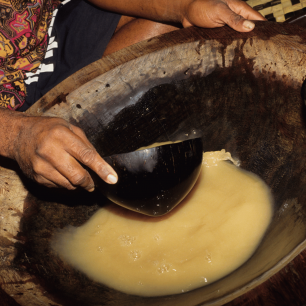Kava is a beverage or extract prepared from the crushed root of the pepper plant (Piper methysticum), that plays an important cultural role in Pacific Islander communities where it is traditionally cultivated by Pasifika communities as a ceremonial drink. In October 2019, the former Australian Prime Minister, the Hon Scott Morrison MP announced that the Australian Government would strengthen its commitment to the Pacific by launching the kava pilot program. The kava pilot program aims to increase stronger cultural and economic ties between Australia and Pacific Island nations. The pilot consists of two phases: personal and commercial importation of kava.
Shakeshaft, Waller, Nathan, Craig, Ravulo, Meo-Sewabu, D'Este, Thapa, Abbott, Satour, Tulele, Wilson, Tyson, Doran, Mhey-Rivas, Macpherson, Graham, Baillie, Tran, Aiken, Harwood, Turner, Reeve.
To determine the impact of the kava pilot program, a monitoring and evaluation program was conducted between April 2021 to August 2023 by the National Drug and Alcohol Research Centre (NDARC) and Ninti One (Ninti), in collaboration with other partners and overseen by a Project Advisory Group. The purpose of the evaluation is to evaluate the impact of the kava pilot program
The monitoring and evaluation of the kava importation pilot aims to answer eight evaluation questions:
- To what extent was the importation pilot implemented as expected?
- To what extent have the expected outcomes of the pilot been achieved? In what contexts has the pilot been more/less successful?
- What have been the cultural, social, health and economic outcomes on: Pacific Islander communities; Aboriginal and/or Torres Strait Islander communities; the broader Australian population?
- To what extent has the pilot increased the commercial supply and distribution of Kava in Australia?
- To what extent has the pilot impacted the supply and use of Kava to communities at higherrisk of kava-related harms including East Arnhem Land?
- How well (effective) has the regulatory framework protected public health?
- What are the cost implications of the pilot for Commonwealth and state/territory governments?
- Are there any unintended outcomes/consequences associated with the pilot?
A mixed methods research design was used for this evaluation. This comprised using both quantitative and qualitative data, drawing on the strengths of each to understand the situation better and answer the evaluation questions. The methods used for this evaluation included a systematic review, interviews, focus groups, community survey, analysis of routinely collected data and economic methods
Project completed
The evaluation highlighted that previous restrictions on kava importation had negative social, cultural and economic impacts on Pacific Island nations and the Pasifika diaspora in Australia. There was broad support for the new policy and its provision of a widely used substance that is critical to the economic and cultural life of Pacific and/or South Sea Islander people here and overseas. The pilot program opens significant trade opportunities between Pacific Island nations and Australia, with the economic benefits from trade, cultural and social impact, and bilateral cooperation, outweighing the implementation costs and minimal reported harms of the program to date. There remains concern over the quality control, black market, and permit system associated with commercial and personal importation which requires further regulation.








